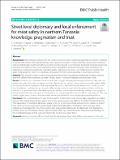Files in this item
Street-level diplomacy and local enforcement for meat safety in northern Tanzania : knowledge, pragmatism and trust
Item metadata
| dc.contributor.author | Hrynick, T A | |
| dc.contributor.author | Barasa, V | |
| dc.contributor.author | Benschop, J | |
| dc.contributor.author | Cleaveland, S | |
| dc.contributor.author | Crump, J A | |
| dc.contributor.author | Davis, M | |
| dc.contributor.author | Mariki, B | |
| dc.contributor.author | Mmbaga, B T | |
| dc.contributor.author | Mtui-Malamsha, N | |
| dc.contributor.author | Prinsen, G | |
| dc.contributor.author | Sharp, J | |
| dc.contributor.author | Sindiyo, E | |
| dc.contributor.author | Swai, E S | |
| dc.contributor.author | Thomas, K M | |
| dc.contributor.author | Zadoks, R | |
| dc.contributor.author | Waldman, L | |
| dc.date.accessioned | 2019-07-08T16:30:04Z | |
| dc.date.available | 2019-07-08T16:30:04Z | |
| dc.date.issued | 2019-07-03 | |
| dc.identifier | 259540407 | |
| dc.identifier | 9935cff5-935c-43bb-a1f0-ffebcddd1efe | |
| dc.identifier | 31269927 | |
| dc.identifier | 85068599879 | |
| dc.identifier.citation | Hrynick , T A , Barasa , V , Benschop , J , Cleaveland , S , Crump , J A , Davis , M , Mariki , B , Mmbaga , B T , Mtui-Malamsha , N , Prinsen , G , Sharp , J , Sindiyo , E , Swai , E S , Thomas , K M , Zadoks , R & Waldman , L 2019 , ' Street-level diplomacy and local enforcement for meat safety in northern Tanzania : knowledge, pragmatism and trust ' , BMC Public Health , vol. 19 , 863 . https://doi.org/10.1186/s12889-019-7067-8 | en |
| dc.identifier.issn | 1471-2458 | |
| dc.identifier.other | ORCID: /0000-0001-5805-4296/work/64698292 | |
| dc.identifier.uri | https://hdl.handle.net/10023/18056 | |
| dc.description | This research was funded by the Biotechnology and Biological Sciences Research Council, the Department for International Development, the Economic and Social Research Council, the Medical Research Council, the Natural Environment Research Council, and the Defence Science and Technology Laboratory, under the UK Zoonoses and Emerging Livestock Systems Initiative (BB/L017679/1 and BB/L018926/1). | en |
| dc.description.abstract | BACKGROUND: With increasing demand for red meat in Tanzania comes heightened potential for zoonotic infections in animals and humans that disproportionately affect poor communities. A range of frontline government employees work to protect public health, providing services for people engaged in animal-based livelihoods (livestock owners and butchers), and enforcing meat safety and food premises standards. In contrast to literature which emphasises the inadequacy of extension support and food safety policy implementation in low- and middle-income countries, this paper foregrounds the 'street-level diplomacy' deployed by frontline actors operating in challenging contexts. METHODS: This research is based on semi-structured interviews with 61 government employees, including livestock extension officers/meat inspectors and health officers, across 10 randomly-selected rural and urban wards. RESULTS: Frontline actors combined formal and informal strategies including the leveraging of formal policy texts and relationships with other state employees, remaining flexible and recognising that poverty constrained people's ability to comply with health regulations. They emphasised the need to work with livestock keepers and butchers to build their knowledge to self-regulate and to work collaboratively to ensure meat safety. Remaining adaptive and being hesitant to act punitively unless absolutely necessary cultivated trust and positive relations, making those engaged in animal-based livelihoods more open to learning from and cooperating with extension officers and inspectors. This may result in higher levels of meat safety than might be the case if frontline actors stringently enforced regulations. CONCLUSION: The current tendency to view frontline actors' partial enforcement of meat safety regulations as a failure obscures the creative and proactive ways in which they seek to ensure meat safety in a context of limited resources. Their application of 'street-level diplomacy' enables them to be sensitive to local socio-economic realities, to respect local social norms and expectations and to build support for health safety interventions when necessary. More explicitly acknowledging the role of trust and positive state-society relations and the diplomatic skills deployed by frontline actors as a formal part of their inspection duties offers new perspectives and enhanced understandings on the complicated nature of their work and what might be done to support them. | |
| dc.format.extent | 16 | |
| dc.format.extent | 924549 | |
| dc.language.iso | eng | |
| dc.relation.ispartof | BMC Public Health | en |
| dc.subject | Butchers | en |
| dc.subject | Extension officers | en |
| dc.subject | Food safety | en |
| dc.subject | Frontline actors | en |
| dc.subject | Meat safety | en |
| dc.subject | Policy implementation | en |
| dc.subject | Tanzania | en |
| dc.subject | RA0421 Public health. Hygiene. Preventive Medicine | en |
| dc.subject | G Geography (General) | en |
| dc.subject | NDAS | en |
| dc.subject | SDG 3 - Good Health and Well-being | en |
| dc.subject.lcc | RA0421 | en |
| dc.subject.lcc | G1 | en |
| dc.title | Street-level diplomacy and local enforcement for meat safety in northern Tanzania : knowledge, pragmatism and trust | en |
| dc.type | Journal article | en |
| dc.contributor.institution | University of St Andrews. School of Geography & Sustainable Development | en |
| dc.identifier.doi | 10.1186/s12889-019-7067-8 | |
| dc.description.status | Peer reviewed | en |
This item appears in the following Collection(s)
Items in the St Andrews Research Repository are protected by copyright, with all rights reserved, unless otherwise indicated.

